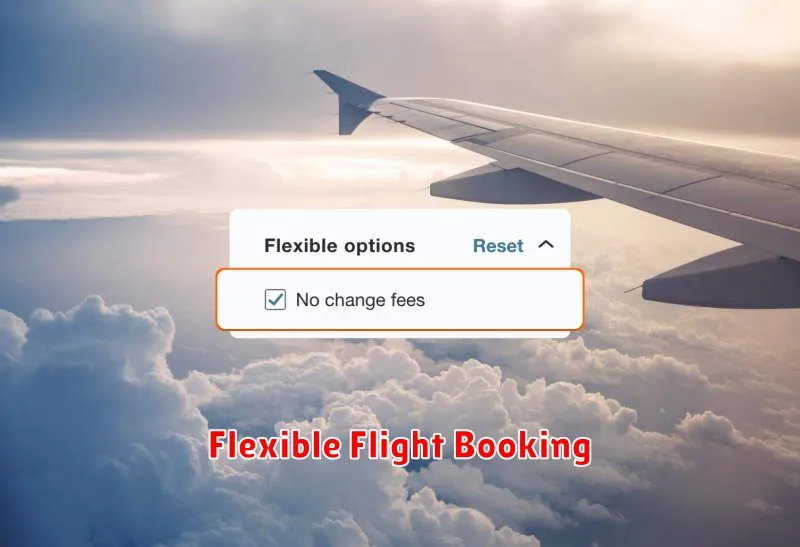Are you dreaming of exploring new destinations but feeling overwhelmed by the complexities of flight booking? Unlocking travel flexibility is a key to making your travel aspirations a reality. With flight booking options constantly evolving, it can be daunting to navigate the myriad of choices and find the perfect balance between price and peace of mind. This guide will equip you with the knowledge and strategies to book flights with confidence, ensuring a seamless and stress-free travel experience.
From understanding fare types and booking windows to maximizing your chances of securing the best deals, we’ll delve into the intricacies of flight booking. We’ll explore how to leverage travel flexibility to your advantage, uncovering strategies to navigate potential disruptions and adjust your itinerary as needed. Whether you’re a seasoned traveler or just starting your journey of exploration, this guide will empower you to make informed decisions and book flights with confidence, unlocking a world of possibilities.
The Rise of Flexible Flight Bookings
The travel landscape is constantly evolving, and with it, the way we book flights. Gone are the days of rigid itineraries and inflexible bookings. Today, flexible flight bookings are emerging as a game-changer, empowering travelers to embrace spontaneity and navigate uncertainty with confidence.
The rise of flexible flight bookings can be attributed to several factors. Firstly, the ongoing pandemic has instilled a sense of caution and a need for flexibility. Travelers are seeking options that allow for changes or cancellations without incurring significant penalties. Secondly, the growing popularity of budget airlines and online travel agencies has introduced a wider range of options, including flexible fare classes. Lastly, the development of innovative technology has made it easier for airlines to offer more flexible booking options and for travelers to manage their bookings with ease.
Flexible flight bookings offer several benefits. They provide peace of mind by allowing travelers to adjust their plans if needed. They also provide cost-saving opportunities, as some airlines offer discounts for flexible bookings. Furthermore, flexible bookings can open up new possibilities for spontaneous travel, allowing travelers to take advantage of last-minute deals or unexpected opportunities.
Benefits of Choosing Flexible Tickets
In today’s unpredictable world, travel plans can change in an instant. That’s why choosing flexible tickets is a smart move for any traveler who values peace of mind. Flexible tickets offer a range of benefits, empowering you to navigate the unexpected and embrace spontaneity without breaking the bank.
Here’s why choosing flexible tickets is a game-changer for your travel experience:
Flexibility and Peace of Mind:
Life happens, and sometimes your plans need to change. Flexible tickets allow you to modify your flight dates or even change destinations without penalty. This gives you the confidence to book your trip knowing you can adjust your itinerary if needed, eliminating stress and freeing you to embrace unforeseen opportunities.
Protection from Unexpected Events:
Whether it’s a sudden illness, a work emergency, or a family obligation, flexible tickets offer a safety net. With the ability to reschedule or cancel your flight, you can avoid costly penalties and ensure your travel plans remain adaptable to life’s inevitable curveballs.
Reduced Risk and Cost Savings:
While flexible tickets may come with a slightly higher initial cost, they can actually save you money in the long run. By providing you with the ability to avoid penalties for changes, you can reduce the risk of losing out on your investment. This is particularly important when facing unexpected situations, like flight cancellations or weather disruptions.
Choosing flexible tickets is an investment in your peace of mind and travel experience. It provides the flexibility to adapt to changing circumstances, protects you from unexpected events, and can even save you money. Embrace the freedom to travel with confidence knowing you have the flexibility to adjust your plans as needed.
Navigating Airline Policies: Cancellation and Change Fees
Booking a flight can be exciting, but it’s also essential to understand the airline’s policies regarding cancellations and changes. These policies can vary significantly between airlines and even within the same airline for different fare classes. This is where the term “flexible ticketing” comes into play. Flexible tickets are generally more expensive but offer more freedom to adjust your travel plans if needed.
Let’s break down some key points to consider:
- Cancellation Fees: These fees can be hefty, especially if you cancel close to your departure date. Some airlines offer waivers for specific circumstances like medical emergencies, but these often come with strict documentation requirements.
- Change Fees: Changing your flight, even for a minor adjustment like the time of day, can incur a significant change fee. These fees are generally lower than cancellation fees but still worth considering.
- Refund Policies: Each airline has its own refund policy. Some offer full refunds, while others may issue travel credits that can only be used with the same airline. Read the fine print carefully to understand the refund process and potential restrictions.
- Travel Insurance: Consider purchasing travel insurance to mitigate some financial risks. Some travel insurance plans can reimburse cancellation fees or provide alternative travel arrangements in case of unforeseen circumstances.
While navigating these policies can be daunting, there are ways to minimize the impact of unexpected travel disruptions. Choose airlines known for their flexibility, carefully evaluate the type of ticket you’re purchasing, and consider travel insurance. By understanding these factors, you can book flights with more confidence and enjoy a smoother travel experience.
Understanding Fare Classes and Flexibility Options
Navigating the world of airfare can be a daunting task, with numerous options and varying levels of flexibility. Understanding fare classes and their associated flexibility options is crucial for making informed decisions and securing the best value for your travel needs. Fare classes, often denoted by letters like “Y,” “B,” or “Q,” represent different price points and come with varying levels of restrictions.
Economy Class fares typically offer the least flexibility, but they come at the lowest price point. These fares may not allow for changes or cancellations without significant fees. Premium Economy fares offer a more comfortable experience with additional perks like extra legroom and baggage allowance, but they come at a higher price and might have limited flexibility options. Business Class fares provide the highest level of comfort and service, but they also come with the most stringent restrictions.
When booking flights, consider your travel needs and flexibility requirements. If you are on a tight budget and your travel dates are firm, an Economy Class fare with minimal flexibility might be the best option. For travelers who require the flexibility to adjust their travel plans or require added comfort, Premium Economy or Business Class fares might be worth considering, even though they come at a higher cost.
While flexible fares allow for changes or cancellations with fewer penalties, they often come at a premium. If you anticipate potential changes to your itinerary, choosing a flexible fare can provide peace of mind and cost savings in the long run. Conversely, if you are confident in your travel plans, a non-flexible fare can offer significant cost savings.
Airlines often offer additional flexibility options, such as “change fees” or “cancellation waivers,” which allow you to modify your itinerary or cancel your flight for a specific fee. These options can be valuable for travelers who are unsure about their travel plans or need to make changes at short notice.
Ultimately, the decision of which fare class and flexibility option to choose depends on your individual needs and preferences. By carefully considering your travel plans, budget, and potential for changes, you can make an informed decision that ensures a comfortable and cost-effective journey.
Tips for Finding Flexible Flight Deals
Traveling with flexibility in mind can be a great way to save money on flights. Airlines often offer discounted fares for travelers who are willing to be flexible with their travel dates and times. Here are a few tips for finding flexible flight deals:
Be flexible with your travel dates: Traveling during the off-season or on weekdays can often lead to lower prices. Consider traveling on a Tuesday, Wednesday, or Saturday, as these are typically less busy days.
Consider flying to a nearby airport: If you’re flexible with your destination, consider flying to a smaller or less popular airport. These airports often have lower prices, especially for flights to major cities.
Use flight search engines: Websites like Google Flights, Kayak, and Skyscanner allow you to search for flights with flexible dates and times. You can use the “flexible dates” feature to see prices for a range of dates.
Sign up for email alerts: Many airlines and travel websites offer email alerts that notify you of price drops for your desired destinations.
Book in advance: Booking flights in advance can often lead to lower prices. However, it’s important to note that prices can fluctuate, so it’s always a good idea to compare prices from multiple airlines and travel websites.
Be prepared to travel with a layover: Flights with layovers are often cheaper than direct flights. If you’re willing to travel with a layover, you can often save a significant amount of money.
By being flexible with your travel plans, you can often find great deals on flights and make your travel dreams a reality. Remember to do your research, compare prices, and be patient when searching for flexible flight deals.
Leveraging Travel Search Engines and Online Travel Agencies
In today’s digital age, securing the perfect flight is easier than ever thanks to the abundance of travel search engines and online travel agencies (OTAs). These platforms empower travelers with a vast selection of airlines, destinations, and flight options, allowing them to compare prices, schedules, and amenities with a few clicks. Utilizing these resources effectively is crucial for unlocking travel flexibility and securing the most advantageous flight deals.
Travel search engines like Google Flights, Kayak, and Skyscanner are your go-to tools for initial research. They aggregate flight data from multiple airlines and OTAs, presenting a comprehensive overview of available options. With advanced filtering capabilities, you can refine your search based on price, departure and arrival times, layover preferences, and even specific airlines. This allows you to quickly identify potential flights that align with your budget and travel needs.
Online travel agencies (OTAs) like Expedia, Booking.com, and Travelocity offer a more comprehensive travel booking experience. They bundle flights with hotels and car rentals, providing convenient one-stop shopping for your entire trip. While OTAs often offer competitive prices, it’s essential to compare their offerings with those of individual airlines and travel search engines to ensure you’re getting the best deal.
By leveraging both travel search engines and OTAs, you gain access to a wider range of flight options and can compare prices across multiple platforms. This proactive approach empowers you to make informed decisions and secure flights that best suit your travel needs and budget. Remember to explore different booking dates and times, consider alternative airports, and be open to flexible travel plans to maximize your chances of finding the most favorable deals.
Exploring Airline Loyalty Programs and Credit Card Perks
The allure of travel often hinges on securing the best flight deals. While navigating fluctuating prices can be daunting, leveraging airline loyalty programs and credit card perks can transform your booking experience into a seamless and rewarding journey.
Airline loyalty programs, such as those offered by major airlines like United MileagePlus, Delta SkyMiles, and American Airlines AAdvantage, grant you valuable benefits. These programs usually involve earning miles or points based on flights flown, and these rewards can be redeemed for future travel, upgrades, and more.
Moreover, credit cards often partner with airlines to offer complementary perks. By holding an airline-affiliated credit card, you can earn miles or points on everyday purchases, boosting your earning potential and potentially even unlocking bonus miles or perks for specific flights.
When considering these options, remember to analyze factors like earning potential, redemption options, annual fees, and other benefits. Some credit cards might offer free checked baggage, priority boarding, or even lounge access for cardholders.
By carefully exploring the different airline loyalty programs and credit card options available, you can unlock a world of travel flexibility and rewards, empowering you to book flights with confidence.
The Future of Flexible Travel: Trends and Predictions

As the travel industry continues to evolve, flexibility is becoming increasingly important for travelers. The rise of remote work, changing travel preferences, and the unpredictable nature of global events have all contributed to a growing demand for travel options that offer greater freedom and peace of mind.
Here are some key trends shaping the future of flexible travel:
- Increased demand for refundable and changeable tickets: Travelers are prioritizing options that allow them to adjust their plans without significant financial penalties.
- Growth of subscription-based travel services: Subscription models offer travelers flexibility in booking flights and accommodations, often with exclusive benefits and discounts.
- Rise of travel insurance with comprehensive coverage: Travelers are seeking insurance policies that protect them from disruptions caused by unexpected events.
- Personalized travel recommendations and itinerary planning: Tech-driven solutions are emerging that cater to individual traveler preferences and offer customized travel suggestions.
These trends suggest that the future of flexible travel will be driven by a combination of technological advancements, consumer demand, and a shift towards prioritizing personalized experiences. Travelers will have more options to choose from, with greater control over their itineraries and financial security.
Embracing Spontaneity: The Joy of Last-Minute Bookings

In a world that often prioritizes meticulous planning, there’s a certain thrill to be found in embracing spontaneity. This is especially true when it comes to travel. While some crave the comfort of a carefully curated itinerary, others thrive on the exhilarating unknown of a last-minute booking.
The joy of last-minute bookings lies in the freedom it offers. By ditching the constraints of a fixed schedule, you open yourself up to a world of possibilities. Perhaps a tempting deal pops up, or you suddenly feel an urge to escape to a new destination. With a last-minute booking, you can seize the moment and turn your travel dreams into reality.
Of course, spontaneity can sometimes come with its own set of challenges. You might find yourself faced with limited options or higher prices, but the potential rewards often outweigh these hurdles. The thrill of the unexpected, the exhilaration of a spontaneous adventure, and the sense of liberation that comes with traveling on your own terms – these are the hallmarks of a last-minute booking. So, the next time you feel a twinge of wanderlust, consider taking the leap and embracing the joy of spontaneous travel. You might just discover your next favorite memory.
Travel Insurance: Protecting Your Plans and Investment

Booking a trip is an exciting endeavor, but it’s crucial to remember the unexpected can happen. Travel insurance acts as a safety net, safeguarding your investment and offering peace of mind. It provides financial protection against various unforeseen circumstances, including flight cancellations, medical emergencies, lost luggage, and travel disruptions.
Travel insurance can be a lifesaver in several ways. It can cover the costs of medical treatment abroad, which can be significantly expensive. In case of flight delays or cancellations, it can reimburse for lost accommodation or new flights. Additionally, it offers protection against lost or stolen belongings, ensuring you don’t face a financial burden in such situations.
When choosing travel insurance, consider your specific needs and the level of coverage required. Factors like your destination, length of trip, and age can influence your insurance needs. A comprehensive policy will provide broader protection, while a basic plan might suit those with shorter trips and fewer potential risks.
Investing in travel insurance allows you to enjoy your trip with greater confidence. Knowing that you’re protected from unforeseen events provides peace of mind, allowing you to truly embrace the adventure and make the most of your travels.
Making the Most of Flexible Bookings: Tips for a Smooth Journey

In today’s ever-changing world, flexible bookings are more relevant than ever. They provide peace of mind, especially when unforeseen circumstances arise. But how can you maximize the benefits of these flexible options? Here are some tips to ensure a smooth and stress-free journey.
Understand Your Booking Policy: First and foremost, thoroughly review your booking policy. Understand the specific terms related to changes, cancellations, and refunds. This information will help you make informed decisions and avoid any surprises down the road.
Consider Travel Insurance: Travel insurance can provide a safety net. It can offer protection against unexpected events like cancellations, medical emergencies, and lost luggage, giving you greater peace of mind.
Stay Informed: Monitor travel advisories, health guidelines, and airline updates. This proactive approach allows you to adapt your travel plans accordingly and avoid potential disruptions.
Communicate Effectively: Keep open communication with your airline or travel agent. Inform them of any changes to your plans and be clear about your needs. This clear communication can make the process smoother.
Explore Alternative Options: Flexible bookings often offer multiple options. If your initial plans change, explore alternative flights, destinations, or travel dates within your booking policy. You might find a solution that suits your new requirements.
By following these tips, you can fully leverage the benefits of flexible bookings and enjoy a smoother travel experience. Remember, flexibility is key to navigating the uncertainties of travel, allowing you to adapt and adjust your plans with ease.

